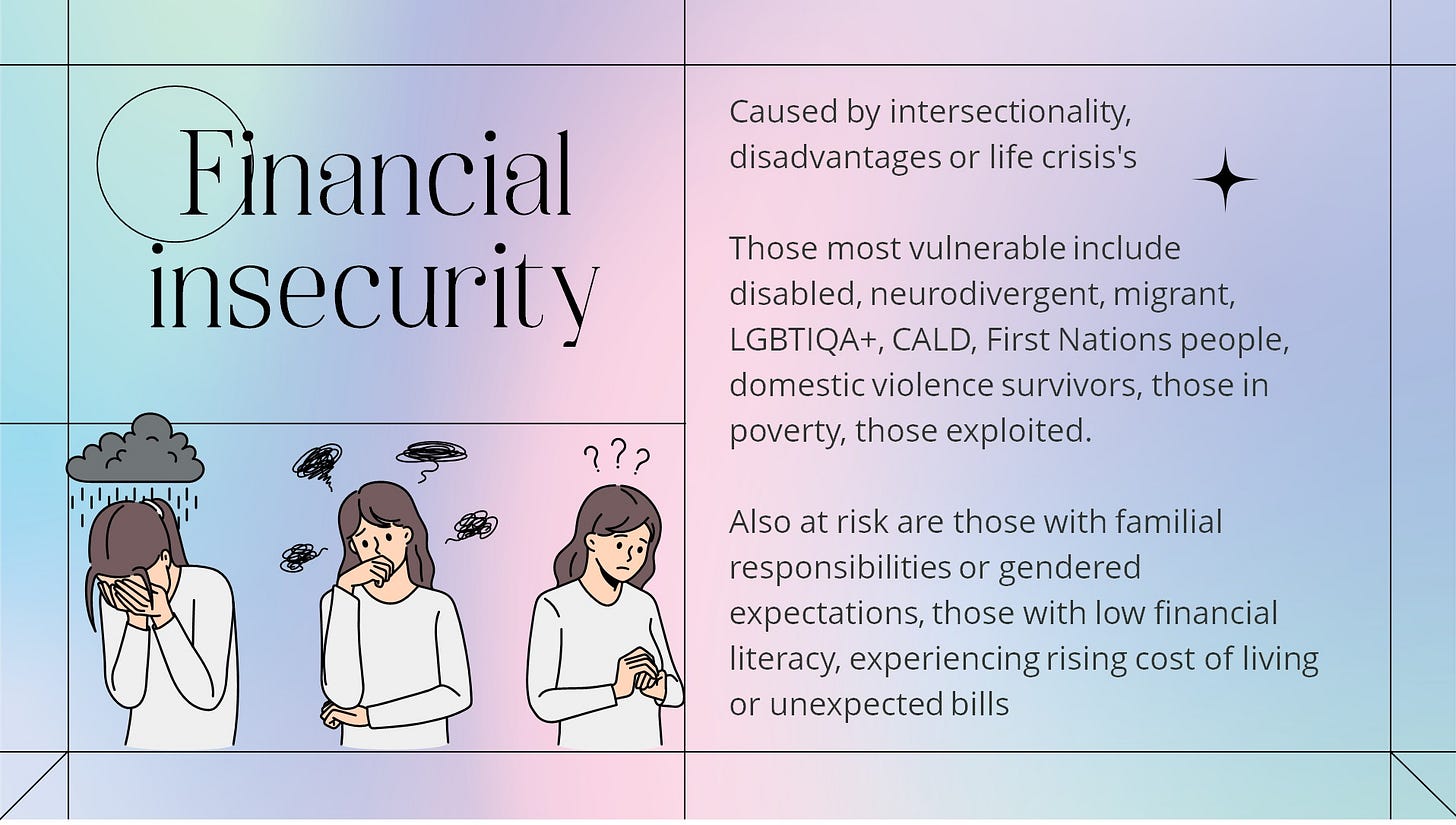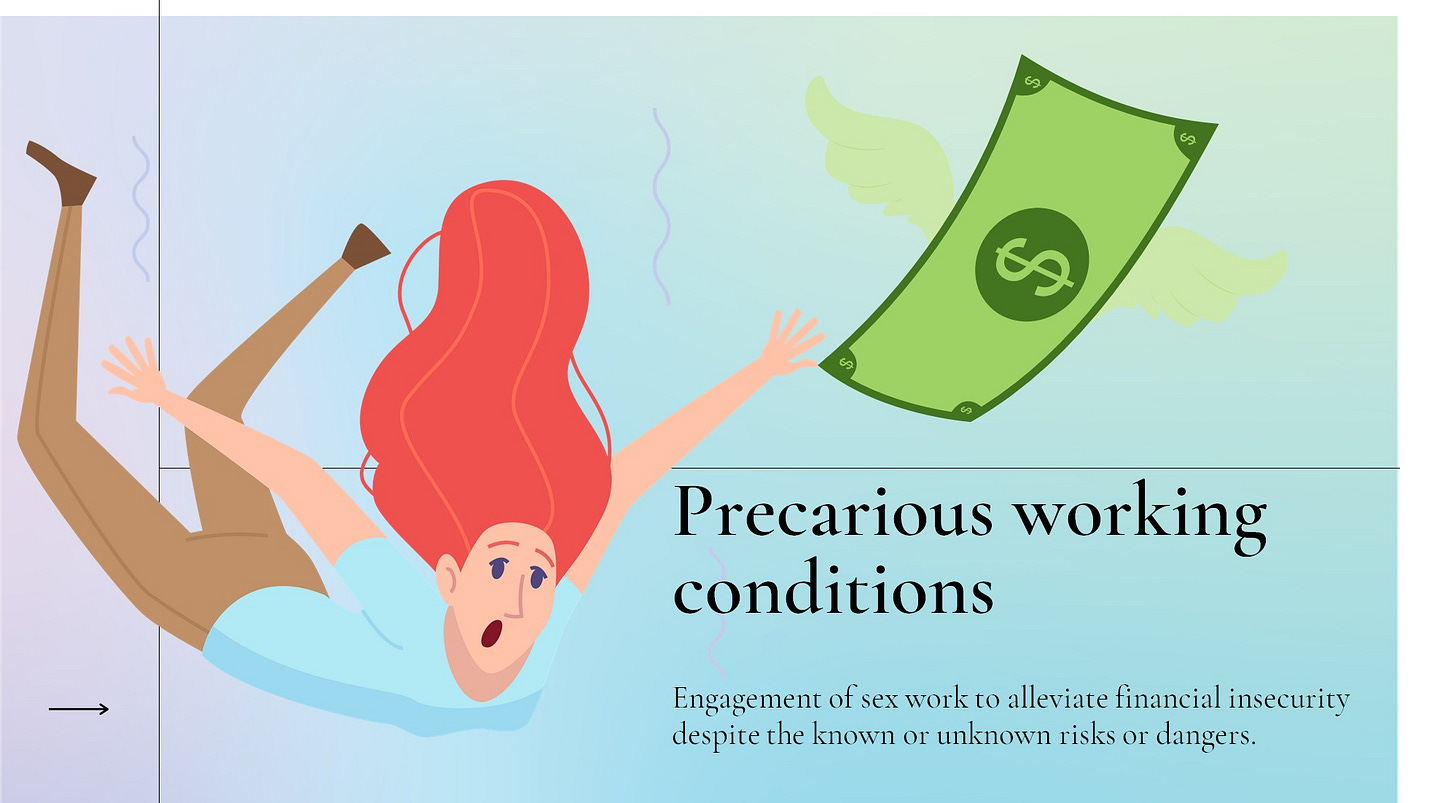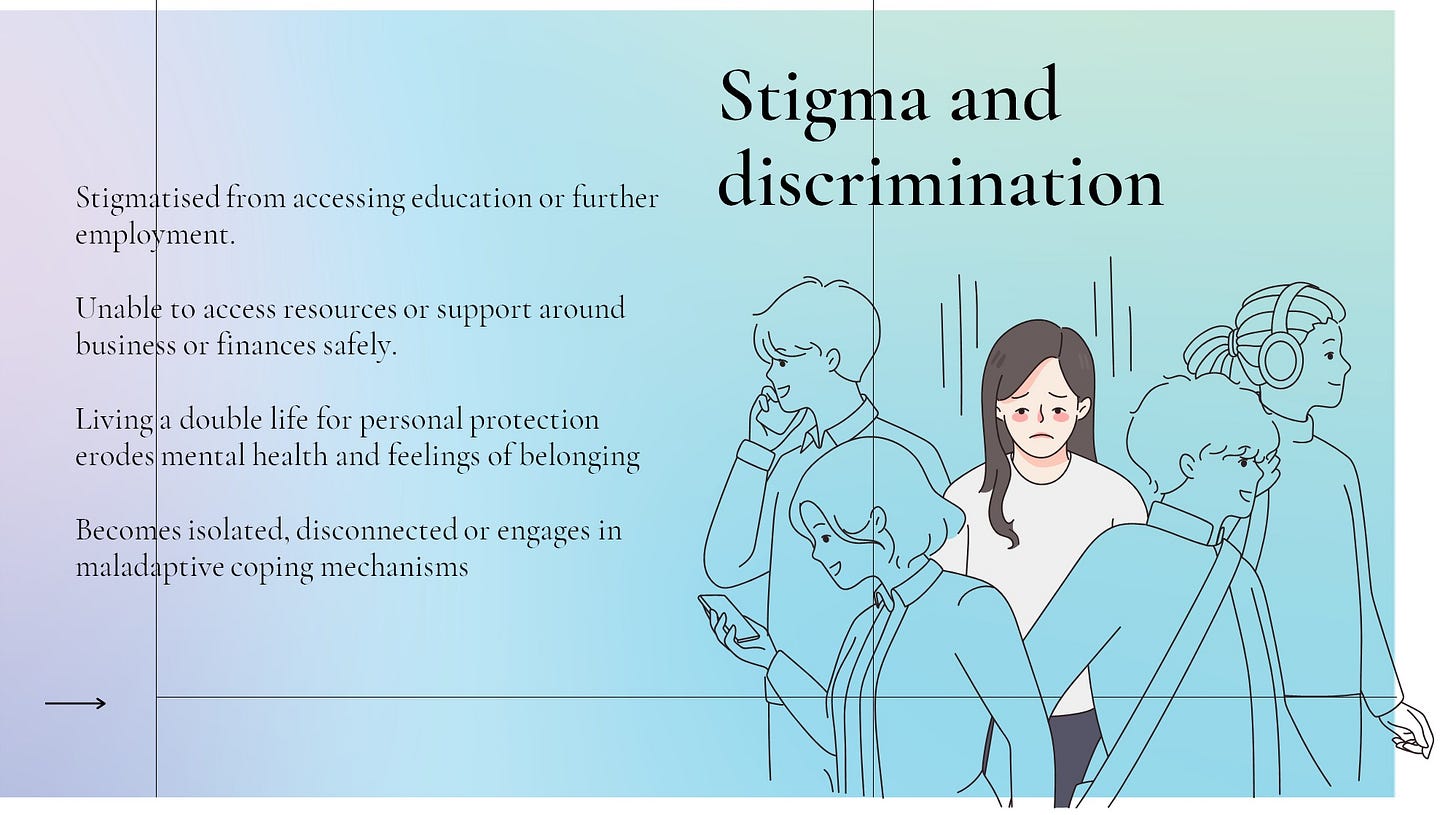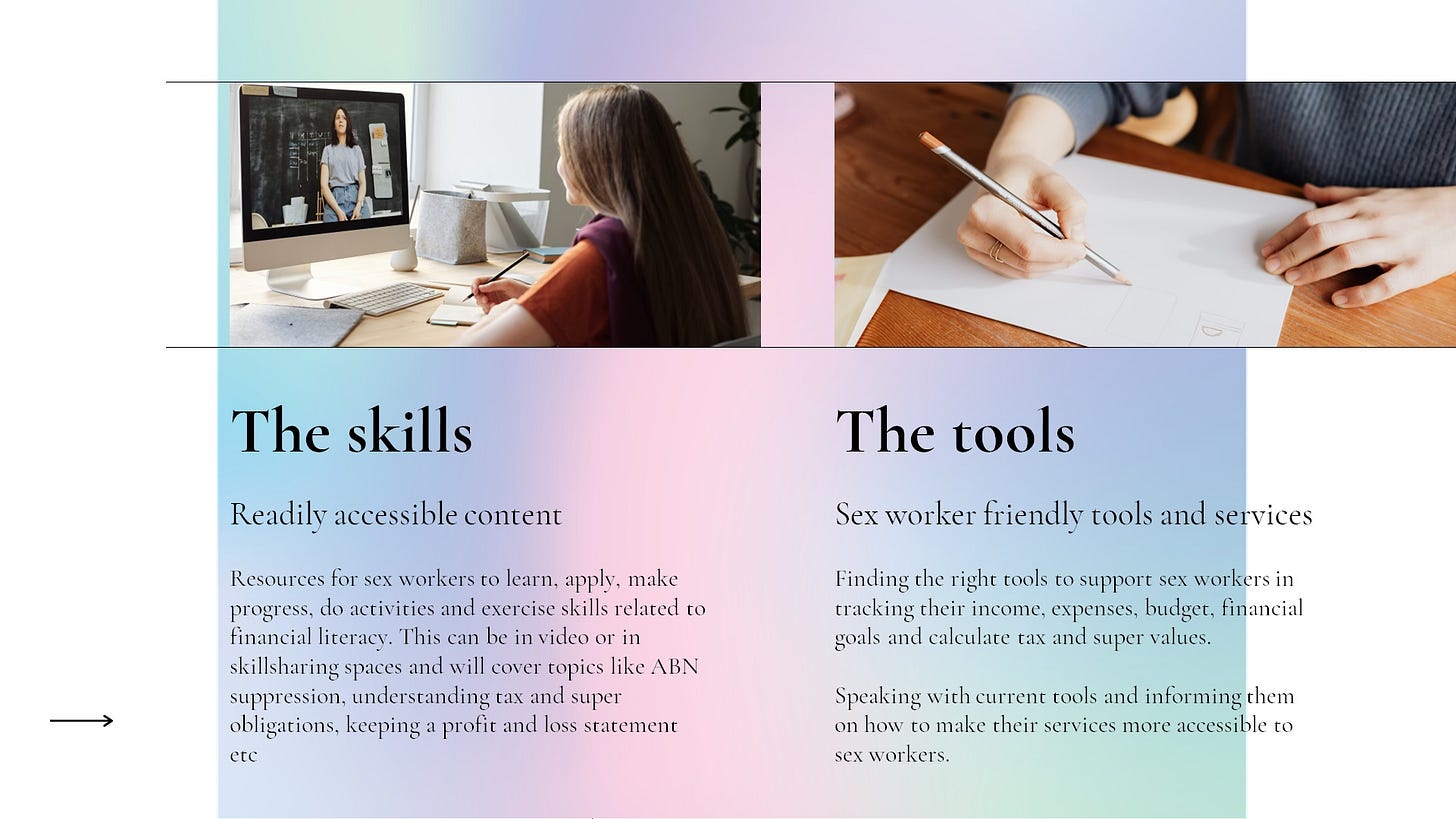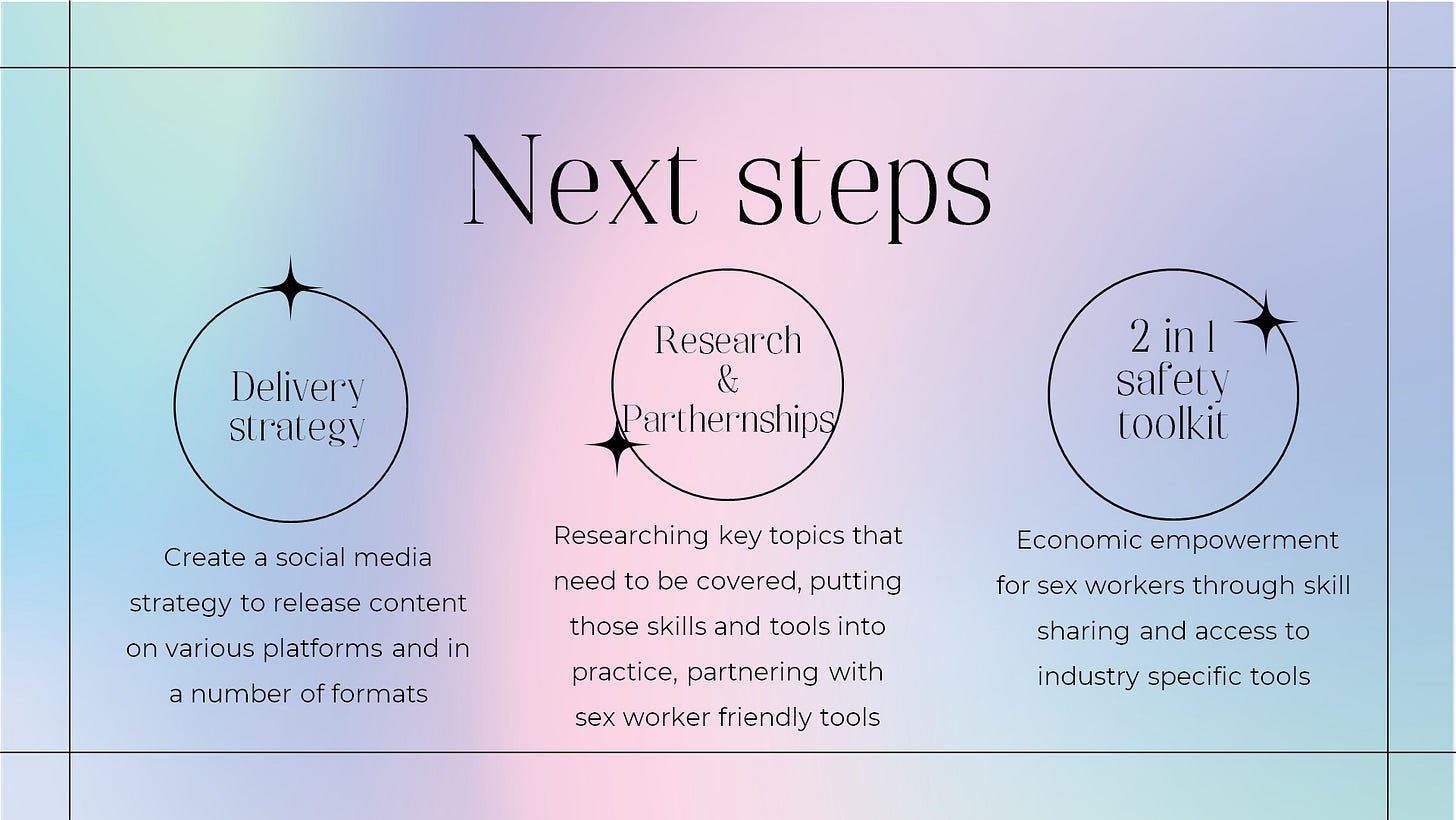Mid-Term progress report
Can economic empowerment make sex work safer?
Preface: This is my mid-term presentation to the Myer Fellowship board. I am posting it here as an act of transparency to my community. The intended audience of non-sex workers and the time limit meant this presentation lacks nuance and substance. However, I feel it sends the general message that financial insecurity is a primary issue for sex workers and that investment into building our community resources is an effective way to tackle this issue. As I have a lot on my to-do list, I am will consider this my December review complete.
Good morning everyone.
Thank you for giving me to opportunity to update you on the progress of my Fellowship.
My Fellowship’s objective was to make sex work safer using technology. Last time we spoke, I suggested a check-in-check-out technology to achieve this and while I still believe this is an effective measure and a good idea, that alone is not enough for long-term impact or change.
So far, this Fellowship enabled me to build community and conduct research. This is important because it doesn’t matter how brilliant your ideas are, if the community doesn’t trust you, if the community doesn’t believe you have their best interest at heart, they will not support you and your project will crash before it even lifts off the ground.
And it was through this research and community building that I realized that a check-in-check-out technology is not suitable as the first step to make the industry safer; in fact this technology is more appropriate as a final part of a more holistic approach to sex worker safety.
Let me explain.
Through my research and my community building, I believe the primary function of Bigger Sister should be to economically empower sex workers and alleviate sex workers from financial insecurity, as this better addresses safety for all sex workers, and it better reflects the needs of the community. There are many things that effect how a sex worker experiences safety, but one common thread is financial insecurity and those most at risk are our most vulnerable.
Sex workers are often not just sex workers, we have intersecting identities, we are mothers, we are migrants, we are disabled and we are rendered vulnerable by the stigma and discrimination. Because we have to live in secrecy, we can’t always ask for financial or business support from people we know, because that exposes us to stigma
Now you’re probably wondering how economic empowerment relates to safety.
Do you know what happens to financially insecure people? People act differently under financial pressure.
People make decisions they normally wouldn’t do if they’re financially insecure. They take risks they normally wouldn’t.
Most sex workers know when they’re walking into danger, but if a sex worker is under some form of financial stress, they’re going to engage in precarious working conditions to make ends meet and a check-in check out technology wont stop them. Only economic empowerment can disrupt the cycle of vulnerability that renders sex workers financially insecure.
My research discovered that while sex workers are generally competent, because of the stigma and discrimination, we have a lot of difficulty accessing information, support, advice, resources or skills related to business or financial management.
Now financial literacy is a privilege for most people, regardless of what industry you work in, but for sex workers it’s a bit different because banks don’t treat us fairly and because many sex workers don’t start life at equal footing with others.
Many of us enter the industry because of a crisis or some form of financial insecurity and we stay that way because the stigma and discrimination cuts us off from the rest of the community. That is why I want to reorient Bigger Sister to focus on economic empowerment as a primary prevention tool to keep sex workers safer.
Let me tell you a story. This happened to me on the weekend.
Picture this: I’ve been away on holidays for the past 7 weeks and in that time, my cash dried up. On top of this, I just got an unexpected message from the ATO telling me I owed them $6k.
Now, as you know, since you’re giving me my payslips, I’m not poor. But because I have deep, complicated trauma related to poverty, unless I have cash in my hands, I don’t feel secure. So what do you think I do to feel financially secure again? That's right, I accept the first booking request that came into my work phone regardless of how dangerous I think the job might be.
I knew from the onset that this guy was going to be trouble, but because of the financial insecurity I was feeling, I was willing to take that risk because I felt I needed the money. When I got to the booking, the whole time I was unsafe and fighting him for control. This guy could not care less about my terms of consent, he wanted to subject me to his sexual demands, and because he paid me, he believed that absolved his duty of care towards me.
After the fact, I had to empty my bank account. You wanna know why? Because I overheard him say he was going to reserve the transaction, which renders the booking into rape by fraud. Do you think when the bank reverses the transaction, they’ll give me back the money? They won’t because I’m a sex worker, that’s how stigma works.
Now would I normally take a booking like this, no, I wouldn’t, but because I felt financially insecure, I felt compelled to. Look at me, I’m a single white educated conventionally attractive person who’s biggest life expense is two cats. Why did I engage in this type of precarity, knowing full and well I have 60k coming next week (fingers crossed)?
I mentioned earlier that a holistic approach is required to ensure the success of this project. What this looks like is two things: the skills and the tools for economic empowerment.
For sex workers to build the skills required for economic empowerment, I need to create content that is accessible and easily available. Since I am now face out, thanks to this Fellowship, I have the option of video and this is a format more dynamic and engaging than text. That’s another thing, a lot of sex workers can’t make videos and share their skills because that requires them to show their face and out themselves, which isn’t always safe to do.
The other half I'll be working on is identifying the tools for economic empowerment. This will help sex workers track income, expenses, budget, both cash and electronical, understand tax and super obligations, and gain some basic foundational financial literacy tools, exercises, practices. I’m hoping this can address common painpoints such as sex workers unable to obtain residencies due to lack of paperwork or financial abuse by payment processors. If I can find these tools, I can work with them to make them more accessible to sex workers, and review their use.
This sort of content will not just benefit current sex workers, but any future sex worker.
So, what’s next for me and this Fellowship?
Well, I’ve got the two-in-one package of skills and tools for economic empowerment in the near horizon. It’s just a matter of reformatting existing content about financial literacy and creating new complementary content for my cohort. In addition, I have begun mapping out the sex worker friendly tools and products to review. I want to apply what I preach to real sex workers and will recruit their stories. I have a strong community of supporters so once all of this is created, I’m confident it will be used. There’s also no reason why anyone else from any other industry experiencing financial insecurity couldn’t access these tools or skills.
Once I am able to deliver this curriculum to sex workers, the Bigger Sister Channel can be used by any other sex worker to share a skill with their community.
I also believe doing everything all at once is going to overwhelm the users, so there’s going to be a long plan to pace the users, teach them new skills and offer new tools.
Thank you and the Myer Family for supporting me through this Fellowship.
They say if you lift one woman out of poverty she’ll bring four with her. But with the opportunity you’ve given me, I think it's more like 400.



